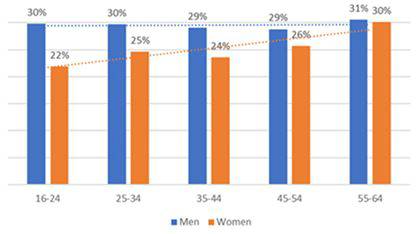In addition, women were also more likely to be responsible for what the household spends on children’s clothing (73% vs 8%), home help costs (27% vs 9%) and short-term savings (53% vs 33%). However, when it comes to long-term savings 61% of men said they were responsible compared to 36% of women. This gender division of responsibilities holds true even in male / female households where women are the main or equal breadwinners.
Overall, Aegon’s index finds 42% of women are struggling with their financial wellbeing compared to 31% of men. Similarly, only 12% of women are able to combine healthy finances and a positive money mindset, compared to 21% of men.
These findings are based on peoples’ responses to a range of questions measuring both their household wealth and the health of their money mindset. Mindset measures included how healthy the social comparison people make about their money are, their financial literacy, but crucially also factors such as whether they have a long-term financial plan, a clear picture of their future self and an idea of what makes them happy – both joy and purpose - now and in the future.
While women were just as likely as men to know what gives them joy and purpose, they scored lower on having a financial plan and a clear picture of their future self – 53% of women said they didn’t have a financial plan, compared to 45% of men. When asked how much thought they had given to their financial goals in life 28% of women said a lot, compared to 33% of men.
Linked to this was a marked division in the proportion of men and women who had a clear picture of their future selves. Women scored lower in every age group on this measure and took till age 55 to almost close the gap with men.
Proportion of men and women who say they have a concrete picture of their future self by age group

Steven Cameron, Pensions Director at Aegon comments: “Unless you know what your long-term financial goals are and have a plan to achieve them it can be difficult to have a truly healthy relationship with your money. Our research finds that in most mixed gender households, women are more likely to have lead responsibility for short-term budgeting and management of the household finances. These important tasks make up much of the outgoings for the average household, but this short-term focus may be depriving many women of the chance to think long-term about their finances. By contrast men are almost twice as likely to assume responsibility for long-term savings.
“We believe this is an important factor that contributes to women having lower financial wellbeing. We’d encourage those in long term relationships to try and build joint financial plans with a shared understanding of long-term goals. Doing so will give both partners a clear idea of what their shared and individual priorities are and mean everyone knows what they’re working towards. Getting a balance between good day to day budgeting and a long-term plan is a crucial ingredient of financial wellbeing and importantly could avoid many women suffering from poor financial wellbeing.”
Nikki Ramskill, The Female Money Doctor, comments: ”Aegon’s research is a vital step forward towards understanding why there are still huge gaps between women and men's finances. It has put into numbers the reason why many women struggle with long-term thinking for their finances and planning for the future. This is something I see a lot in my dual capacity as a money coach for women and a GP. All too often, the division of money in a relationship becomes linked to "traditional" roles like child-caring and budgeting for food and household bills, leaving no room for long-term saving, investing and planning for retirement. I see the burn out and ill health that comes with the daily burden of trying to "do it all", so it is not surprising that there is little energy left for thinking about the future.
“Couple this with a still-male dominated investing industry, and long gaps in pension contributions, and it's no wonder that women are not reaching their fullest potential and lack confidence when it comes to their long-term financial health. Our money mindset is so important when it comes to feeling in control of our finances. We don't talk about money enough, so I welcome this research to shine a light on what goes on behind closed doors to help people understand more about themselves and their wealth.”
|

